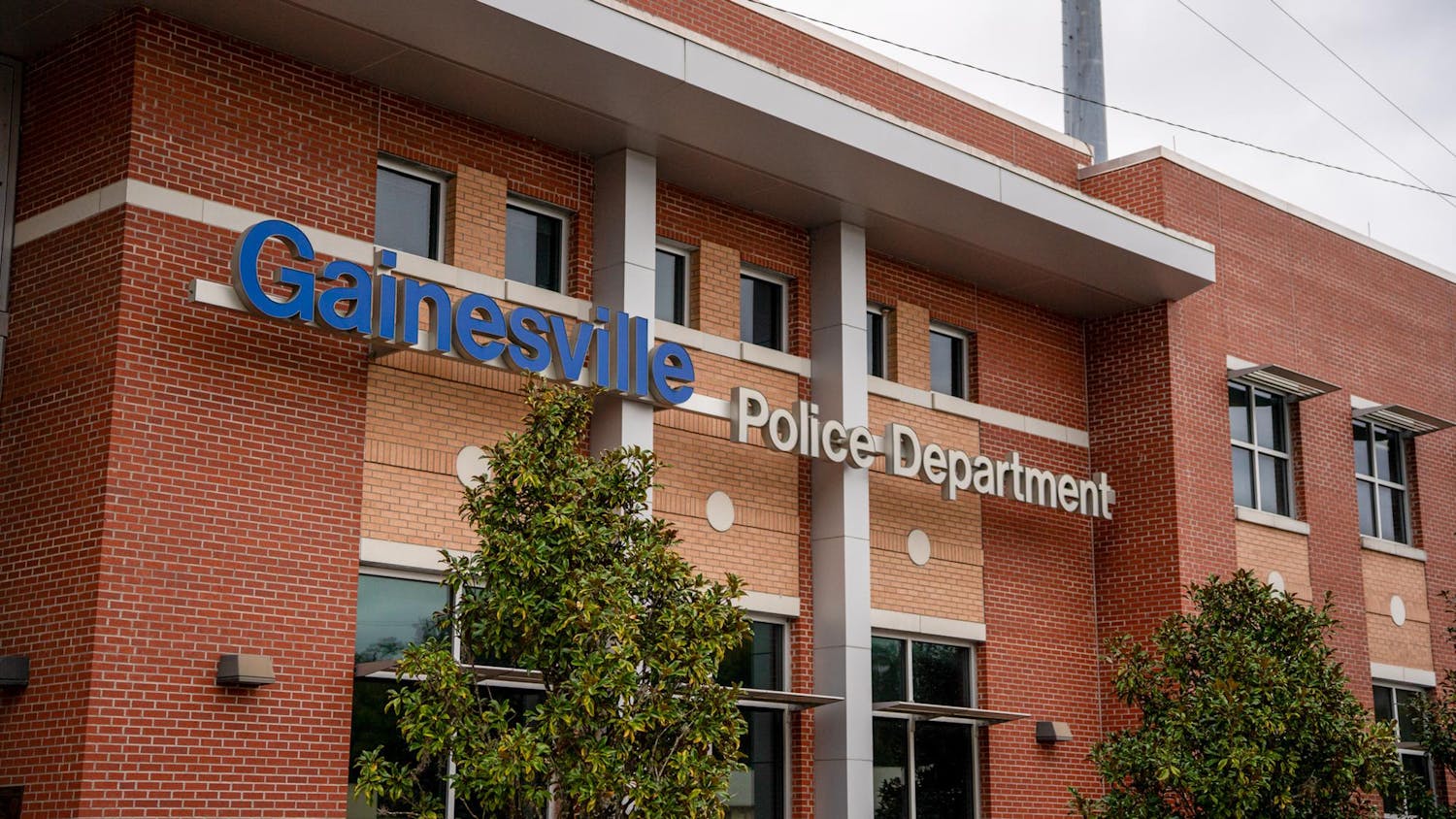Florida’s controversial surgeon general Joseph Ladapo — who is also a tenured professor of medicine at UF — is at odds with the university over whether the public should receive new COVID-19 boosters.
Ladapo has urged people under the age of 65 against receiving the boosters — defying recommendations made by UF and the U.S. Food and Drug Administration.
Separately, UF Health officials are helping Ladapo develop a seminar course on the “critical evaluation of scientific evidence,” he proposed in August 2022, according to emails obtained by The Alligator.
Some UF faculty have shared concerns about Ladapo’s campaign of skepticism regarding the efficacy of COVID-19 vaccines, lockdowns and mask mandates. Additionally, Ladapo’s fast-tracked hiring at the university in September 2021 has drawn scrutiny from the UF Faculty Senate.
Florida lawmakers and UF Health faculty also suggest Ladapo’s medical recommendations should be examined thoroughly.
Ladapo and UF’s differing recommendations on the new COVID-19 boosters
The U.S. Food and Drug Administration approved new COVID-19 boosters Sept. 11 to target several new variants of the virus.
In a Sept. 13 call with Gov. Ron DeSantis, Ladapo argued there isn’t enough evidence to show the benefits of receiving the boosters outweigh any potential risks, according to the Washington Post.
The call — accompanied by a banner that read: “No Way FDA” — was live-streamed on the social media platform X, formerly known as Twitter.
UF recommended the university community receive the new COVID-19 boosters five days after the livestream.
“The UF community is encouraged to visit the UF Health website to find vaccine locations,” UF Human Resources wrote in an email to faculty and staff Sept. 18.
Ladapo and UF Health did not respond to questions about their contradictory stances on the new boosters.
UF students, faculty and staff can receive vaccines and boosters from the Student Health Care Center and UF Health pharmacies at no cost. UF community members interested in vaccination can visit the UF Health website for details on vaccine availability across Alachua County, Duval County and North Central Florida.
Information about the new vaccines can be found at the Centers for Disease Control website.
Ladapo's proposed seminar on “critical evaluation of scientific evidence”
Ladapo emailed UF Health President David Nelson last August asking for help developing a “seminar/course on critical evaluation of scientific evidence.”
Nelson obliged and emailed Ladapo back several hours after he received his initial proposal for the seminar.
“We will get you connected for a seminar series that can be accessed across the UF Health system,” Nelson wrote.
In the same email, Nelson recommended that the UF Clinical and Translational Science Institute help Ladapo navigate the official submission process for his seminar proposal.
The UF Clinical and Translational Science Institute was founded in 2008 to “speed the translation of scientific discoveries into improved health by strengthening the university’s ability to conduct clinical and translational research,” according to its website.
The institute is led by Duane Mitchell — who The Alligator identified as a member of UF president Ben Sasse’s “transition team” in May.
Nelson emailed Mitchell a week after his exchange with Ladapo asking to discuss the proposed seminar.
“I suspect that this will have broad applications across many colleges and thus am hoping the CTSI can help to facilitate,” Nelson wrote.
Ladapo confirmed in an email he sent to Nelson in April that he has been “in communication” with Mitchell about “a seminar.”
In the email, Ladapo also provided new details about his plans, including “a course now focused on evaluating medical/scientific evidence,” and that “the best timeline… [to] organize would now be the fall.”
“I think the course would be of substantial interest to individuals in health policy, analytic methods, and how scientific recommendations develop and evolve,” Ladapo wrote.
Nelson advised Ladapo a day later to seek more information about how to advance his seminar proposal. He referred Ladapo to UF associate provost for academic and faculty affairs Chris Hass and the UF Health Outcomes and Bioinformatics department.
Ladapo and Nelson’s email exchange from April was the most recent interaction between UF Health officials regarding the seminar produced by the records request obtained by The Alligator.
UF Health Spokesperson Gary Mans confirmed in a Sept. 22 statement to The Alligator that Ladapo’s proposed seminar is in active development and will undergo standard review processes under UF Health.
“The topic, timing, and format of the presentation related to the proposed seminar continue to be discussed,” Mans wrote. “All UF Health course offerings go through the college’s review and approval process.”
Ladapo did not respond directly to The Alligator’s questions asking for details about the proposed seminar.
Lawmakers and scholars are skeptical of Ladapo’s medical recommendations
Ladapo’s presence at UF has been scrutinized since his hiring in September 2021. His opinions on issues related to the COVID-19 virus and speculation that state politics played a role in his fast-tracked hiring at UF generated controversy among UF faculty and state lawmakers.
Members of the UF Faculty Senate produced a report in March 2022 that revealed UF Board of Trustees chair Mori Hosseini, who has ties to Gov. Ron DeSantis, sent Ladapo’s resume to UF Health President David Nelson less than three weeks before Ladapo was granted a tenured faculty position at the university.
Some state lawmakers and UF Health faculty believe Ladapo’s medical recommendations should be reviewed carefully in light of his disagreements with the university on COVID-19 vaccines.
Ladapo should be viewed as a politician, not a medical professional, said State Rep. Anna Eskamani (D-42).
“I really look at Dr. Ladapo as more being a political figure than a Surgeon General at this point,” Eskamani said.
Eskamani said the DeSantis administration has continuously misled the public with its stance on COVID-19 research.
“I'm very concerned that conservatives in particular have hand-picked data,” Eskamani said. “They intentionally misinterpret information to feed into a political agenda and all of us should be very cautious and skeptical of guidance that comes out of this administration.”
High-quality research has to be sound in its theoretical foundation and undergo peer-review, Eskamani added.
Matt Hitchings, a UF assistant professor of biostatistics, is skeptical of the Florida Department of Health’s 2022 study of COVID-19 vaccine risks.
Ladapo altered the state-driven study to suggest that some doses pose a significantly higher health risk for young men than had been established by the broader medical community, according to documents obtained by Politico.
Hitchings, along with three other UF professors, authored a Tampa Bay Times op-ed last year detailing potential limitations and concerning scientific analyses conducted within the study.
The researchers wrote that certain analyses should have been completed, but it was revealed later by public records requests that these analyses were removed, Hitchings said.
“It seemed very logical to conclude that they were entirely taken out because they didn’t support the results or they didn’t support the message that the [Florida Department of Health] wanted to convey,” he said.
Hitchings claims that the UF College of Medicine views Ladapo’s concurrent positions at UF and the Florida Department of Health as two distinct roles.
“At some point, they’re going to have to come to terms with the fact that … he’s teaching [and] he’s going to be doing research here,” Hitchings said.
This is a developing story. Check back to The Alligator for updates.
Contact Garrett Shanley and Jinelle Vazquez at gshanley@alligator.org and jvazquez@alligator.org. Follow them on Twitter @garrettshanley and @vazquezjinelle.
Garrett Shanley is a fourth-year journalism major and the Spring 2025 university editor for The Alligator. Outside of the newsroom, you can find him watching Wong Kar-Wai movies and talking to his house plants.
Jinelle Vazquez is a senior at UF pursuing a major in Public Health with a minor in Indigenous Studies. They currently report for the enterprise desk covering health. In their free time, they enjoy hiking, photography and making art.






